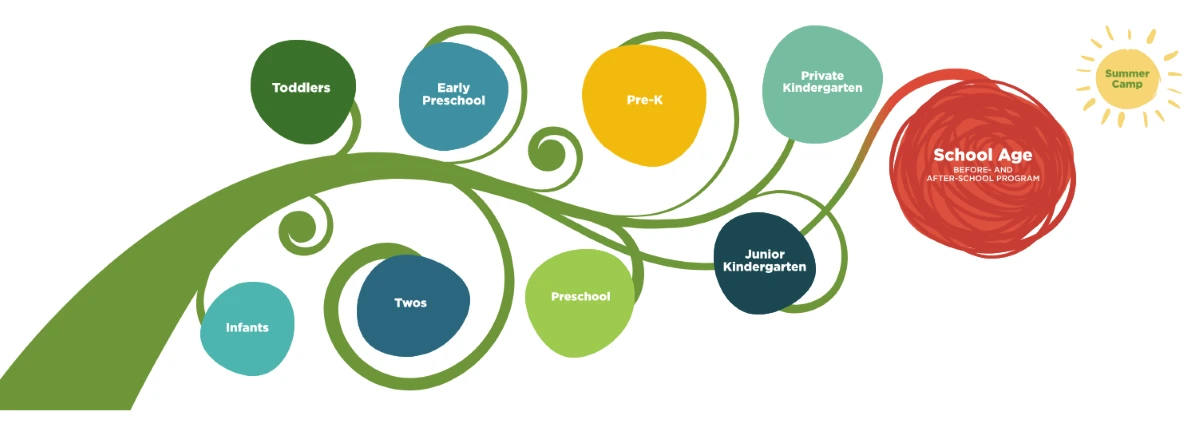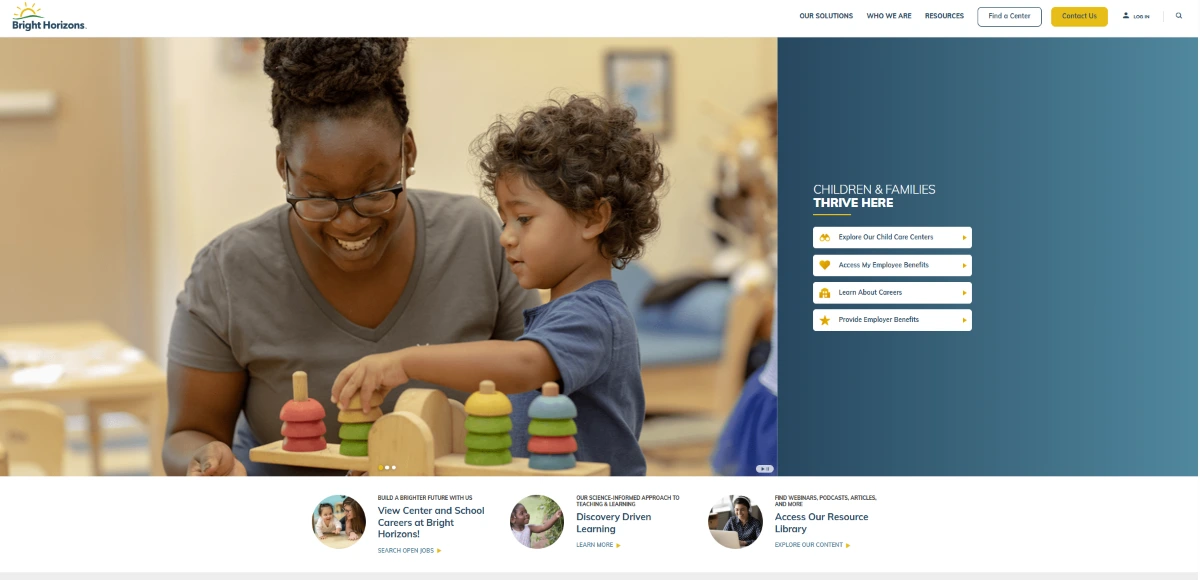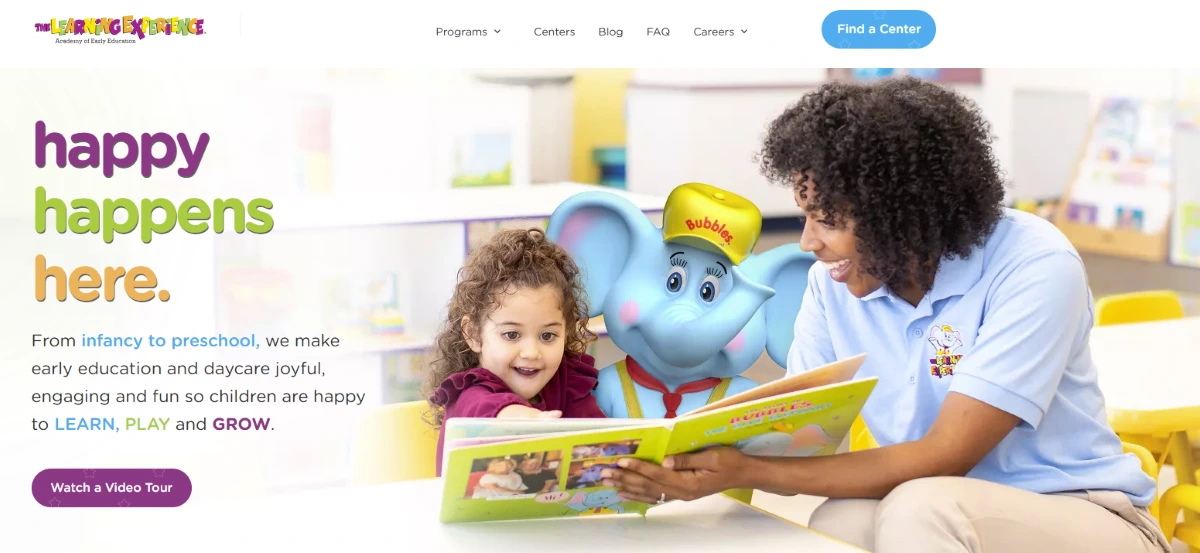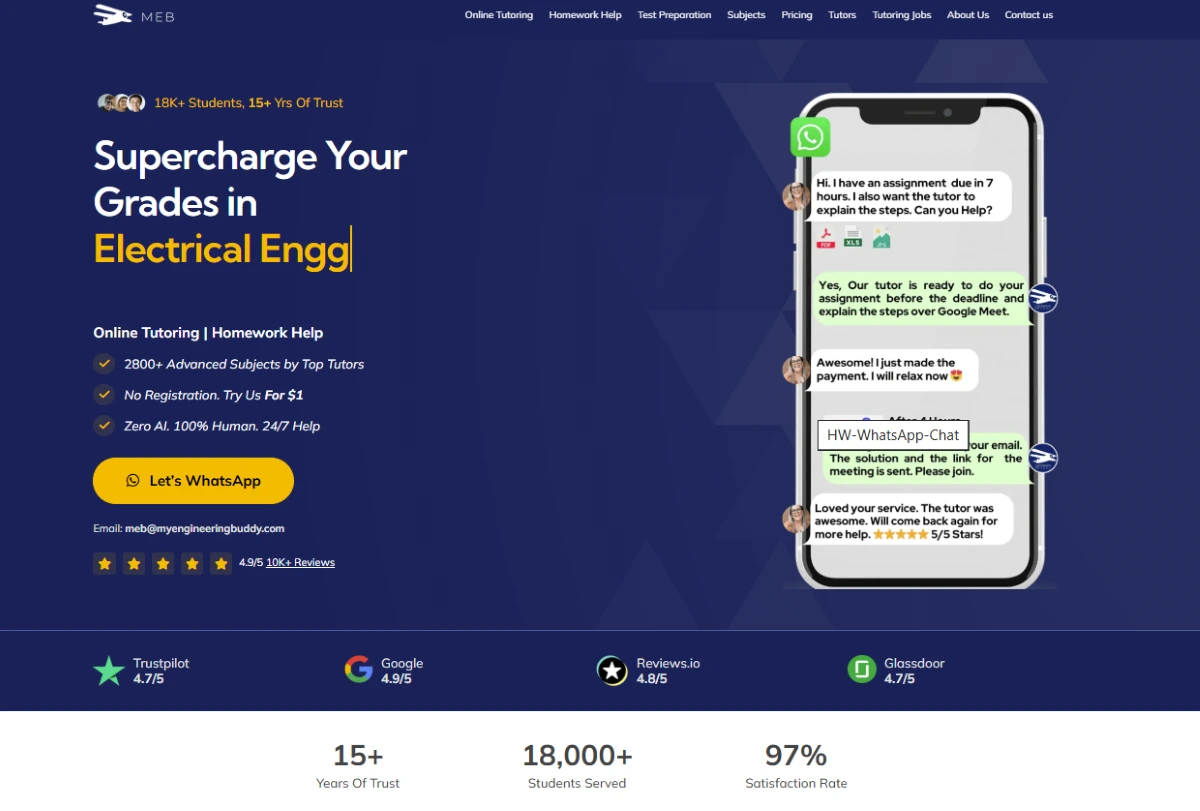Tutor Time is a nationwide early childhood education chain known for daycare and preschool programs. It serves infants through 5th graders in a safe, development-focused environment. Below, we cover parent reviews, cost, and what to expect in 2025 at Tutor Time centers.
Tutor Time Reviews and Testimonials
Parents’ reviews of Tutor Time centers are mixed, reflecting local staff and management. Some families praise the caring teachers, solid curriculum, and modern facilities. For example, parents on review sites say things like “we have loved Tutor Time… the staff have all been amazing and our daughter learns so much”, and “great experience so far” with long-term enrollment. Tutor Time’s own blog also highlights positive parent stories: one mom says her daughter “came back [from camp] full of information… Tutor Time is fantastic and I would recommend this center to anyone!”. These testimonials focus on engaged learning and joyful activities in summer camps and preschool programs.
However, some reviewers report problems at specific locations. Negative comments on Yelp mention administrative issues or unfriendly staff. For instance, one parent complained the staff “was very rude” and inflexible during enrollment. Another said the director demanded paperwork details without a tour, calling the staff “very rude”. These comments suggest occasional customer service or policy hassles. On balance, most reviewers emphasize hands-on learning and attentive teaching, but some advise parents to carefully tour their local school before enrolling.
Is Tutor Time Legit?
Yes. Tutor Time is a long-established, accredited franchise in the Learning Care Group (LCG). It was founded in 1988 and has nearly 200 schools in the US, Hong Kong, and Indonesia. The chain holds quality accreditations (e.g. NAEYC) and meets strict state licensing standards. The company’s mission stresses educational development, self-esteem, and a safe environment. In practice, centers follow a structured curriculum with trained educators. While individual experiences vary, Tutor Time is a legitimate early education provider that thousands of families trust each year.
Tutor Time Pricing
Pricing Range
Tutor Time tuition varies widely by location and the child’s age. In the U.S., full-time weekly rates often run from about $160 to $325 per week, depending on region and program. For example, one Texas center’s rate is around $203/week and another California school is about $325/week. Overseas locations may use local currency (e.g. Indonesian Rupiah or Hong Kong Dollar). For reference, in early 2025 these USD rates correspond to roughly £130–£260, AED 590–1180, or AUD 225–455 per week. Families choose full-day or part-day plans; younger infants often cost more than toddlers, and prices can be higher in urban or high-cost areas. The official Tutor Time tuition page advises parents to call for a specific quote, since costs reflect local factors and chosen schedule.
What students say about Tutor Time Pricing
Parents often comment that daycare is expensive, and Tutor Time is no exception. Review sites mention that quality care seems worth the cost for some, but others note higher fees. Comparisons to industry averages suggest Tutor Time is generally in line with other private daycare prices. For instance, national daycare averages are roughly $200–$300/week, similar to many Tutor Time rates. Some parents say they feel the educational value justifies the cost, while a few feel pricing should be more flexible. Overall, feedback indicates Tutor Time’s pricing is typical for franchised preschools, neither exceptionally low nor exorbitant compared to competitors.
Hidden costs
- Registration Fee: Most centers require a non-refundable annual registration fee. Enrollment forms state “payment of a non-refundable registration fee is required on an annual basis… as determined by the school. This is often around $100–$150 per child, varying by location (e.g. one GA site shows $150).
- Supplies/Activity Fee: Some centers charge a supply fee for classroom materials or activities (around $50–$100 yearly) These are typically small compared to tuition.
- Late Pickup/Payment Fees: A late pickup fee is common. For example, one enrollment form lists a late fee of $15 per every 15 minutes past closing time. Late tuition payment fees may also apply, and very overdue accounts risk suspension or withdrawal.
- Optional extras: Fees for extended programs (before/after school, summer camp, Spanish classes, music, STEM, etc.) are extra. For instance, summer camp or electives may cost extra by the week or session. Childcare contracts may also include charges for field trips, uniforms, or special events.
How Tutor Time’s pricing works
Tutor Time offers both full-time and part-time plans. Part-time care (fewer days per week) costs less but often needs consistency. Centers may also sell prepaid “Flex Care” day-passes: parents can buy blocks of days (e.g. 5-day cards valid 1 year) for occasional use:. These cards have no extra registration fee when used, providing flexibility for drop-in or holiday care. Payment is typically made weekly or monthly via ACH transfer or credit card. Tutor Time accepts certain childcare subsidies and offers corporate tuition programs for employers.
Family discounts and promotions exist. For example, active military families get a 10% tuition discount for new enrollees (proof of service required). Occasionally centers run sibling discounts or summer deals, but these vary by location. There is no widely advertised free-trial; instead parents usually schedule a tour or one-day shadow to gauge fit.
Free Trial
Tutor Time does not typically offer free trial classes. Instead, families are encouraged to visit on a scheduled tour to see the school. However, parents can use “Flex Care” day cards to try out a day of care without long-term commitment:. Once enrolled, if unsure, parents can often arrange a trial week through center management, but standard tuition applies unless otherwise agreed.
Refund policy
Tutor Time’s public materials don’t spell out a corporate refund policy. Enrollment contracts emphasize payment obligations, not refunds. In practice, tuition is paid in advance and usually non-refundable for absences. The official enrollment form warns of possible withdrawal if accounts aren’t kept current, but does not guarantee any refund upon leaving. Parents report that prorating or refunds are rare: final pay is typically due even if a child withdraws mid-week. For fee concerns, customers should consult their local center’s written policies when enrolling.
Tutor Time Alternatives
Even loyal parents consider options. Alternatives to Tutor Time include other daycare franchises and educational programs. Different families may prioritize factors like cost, curriculum, location, or online options. Below we compare several well-known early learning services (including an online tutoring site) to Tutor Time.
Bright Horizons Family Solutions
Bright Horizons is a large, premium daycare and employer childcare provider (founded 1986). It offers infant-to-K programs, backup care, and international preschools. Pricing at Bright Horizons tends to be on the higher side (comparable to top-tier centers, often above $250–$300 per week) due to its global quality standards. Like Tutor Time, Bright Horizons uses certified teachers and accredited curriculum, but it also provides specialty programs (e.g. global early education, college coaching) and strong employer partnerships (tuition subsidies, on-site centers). Parents often give Bright Horizons high marks for facility quality and staff training. However, some cite high costs and waitlists as downsides.
KinderCare Education
KinderCare (founded 1969) is one of the nation’s largest preschool chains. It covers similar age ranges (infants through school-age) and offers both childcare and preschool curricula. KinderCare centers use a structured learning approach, often branded “School Readiness” curriculum, akin to Tutor Time’s LifeSmart®. Tuition is generally similar to Tutor Time’s range ($150–$300/week) depending on location. KinderCare is known for comprehensive safety and enrichment (music, STEM, language), and many sites boast NAEYC accreditation. Parents report good teacher quality but sometimes complain about teacher turnover or varied experiences across locations. Availability may be broader than Tutor Time in some regions (KinderCare has ~1700 centers nationwide).
The Learning Experience
The Learning Experience (TLE) (founded 2002) is a rapidly growing franchise with hundreds of centers. Based in Florida, TLE emphasizes a play-based STEM curriculum and bilingual classes. It often highlights its proprietary tech (screen-free learning tools) and has a flashy brand presence. Costs at TLE tend to be premium (many report $250–$350/week) reflecting its modern facilities and extensive hours (some open 7 days a week). Tutor quality is generally high, but reviews note that staff experience can vary due to rapid expansion. Trust signals include its corporate training programs and accreditations. Compared to Tutor Time, TLE may have more weekend and extended-hour options, but sometimes higher prices.
Kiddie Academy Educational Child Care
Kiddie Academy (founded 1981) offers “educational childcare” in the Mid-Atlantic and other states. Serving infants to age 12 with after-school programs, Kiddie Academy uses a well-defined curriculum (often called “TAB” or “Certified Kiddie Academy Programs”) and continuous teacher training. Its pricing is on par with Tutor Time (often $180–$300/week), though specific rates vary by academy. Parents praise Kiddie Academy for its engaged staff and development programs, but note that quality can depend on local franchise owners. Kiddie Academy centers are generally smaller than big chains, which some families prefer for a cozier feel. It is as legitimate and accredited as Tutor Time, but on a smaller national scale.
My Engineering Buddy
My Engineering Buddy (MEB) is an online tutoring platform (not a daycare) targeting older students (middle school through college) with STEM and test prep. It is headquartered in India/USA. MEB offers one-on-one live tutoring across 100+ subjects (AP, college engineering, etc.) at rates starting around $20/hour. Unlike Tutor Time’s physical centers, MEB is entirely online. Tutor quality is rated highly on review sites (e.g., Trustpilot 4.7/5, Google 4.9/5). Tutor Time uses full-time certified teachers on-site, while MEB uses contract tutors via video chat. Usability: MEB offers on-demand scheduling on its website, whereas Tutor Time requires set enrollment. On trust: Tutor Time is NAEYC-accredited and part of LCG, whereas MEB is newer but has positive online ratings and service guarantees (97% satisfaction). In short, MEB is a very different model – more akin to supplementing older kids’ STEM learning, not a substitute for daycare or preschool.
How it Works
For Students (Families)
Parents start by finding their neighborhood Tutor Time school on the website and scheduling a tour. During the tour, families see classrooms for their child’s age group (infant, toddler, preschool, etc.) and meet directors. After selecting a plan, parents complete enrollment forms (including emergency contacts and health records). Tutor Time offers both full-time schedules and flexible options like drop-in or summer care. Once enrolled, children attend on regular days, following the curriculum. Parents often connect via the Tutor Time SproutAbout app (live video updates and photos). Ongoing communication (daily reports, teacher conferences) is standard. If a family needs to change schedules or withdraw, they contact the local director. Tutor Time does not match tutors one-on-one; instead, every student is assigned to the classroom teachers.
For Tutors (Educators)
Tutor Time hires early childhood educators (called “teachers” or “staff”) for each center. Applicants typically need a Child Development Associate (CDA) credential or an associate/college degree in education. To apply, candidates use the LCG careers site and choose Tutor Time locations or roles (lead teacher, assistant, director). The company provides robust training (CDA prep, Master Teacher program) after hiring. Pay varies by role and region; job listings show positions like child care cook or housekeeping at around $17–$20/hour, and lead teachers often make more. Many centers offer benefits: professional development, tuition assistance, health insurance, and perks like DailyPay (on-demand wage access). Working hours depend on the classroom: Lead teachers usually work weekdays (often 40+ hours), while part-time or floaters have flexible shifts. Glassdoor/Indeed ratings are about 3.0/5, with employees noting a “clear sense of purpose” but calling pay an area for improvement. In practice, teachers set no personal fees (the center sets tuition), and all credentialed educators follow the Tutor Time curriculum. Senior teachers can advance to mentor or director roles over time.

FAQs About Tutor Time
- How does Tutor Time compare to My Engineering Buddy? Tutor Time is an in-person daycare for infants through age-12 (mostly pre-K), while My Engineering Buddy is an online tutoring service for older students (middle school/college level) focusing on STEM. Tutor Time charges weekly tuition (roughly $150–$300+) and uses certified teachers in centers. MEB charges hourly ($20+/hr) via video lessons with subject specialists. Tutor Time emphasizes early childhood development; MEB emphasizes academic exam prep. Both have high customer satisfaction but serve very different needs
- What ages does Tutor Time serve? Tutor Time centers generally serve children from 6 weeks old up through pre-kindergarten or junior K (around age 5–6). Many locations also offer before/after-school care for elementary-aged kids and full-day camps for older children during breaks. The programs are divided into infant, toddler, early preschool, preschool, Pre-K, and sometimes “Junior Kindergarten.”
- Is Tutor Time safe? Yes. Safety is a top priority. For example, Tutor Time HK notes all classrooms are on ground level for easy evacuation. In the U.S., centers typically have secure check-in systems and CCTV. All staff are background-checked and many are CPR-certified. The chain also adheres to local licensing and has low child-to-teacher ratios. Policies on illnesses and drop-off procedures are strict. Parents can ask each center about specific safety features, but as a group, Tutor Time meets or exceeds childcare safety standards.
- What does the curriculum include? Tutor Time uses a research-based program covering all key early learning domains. Kids experience language, math, science, art, social studies, music, and physical play every week. (For example, the HK curriculum stresses Science, Math, Literacy, Art, and PE in English and Mandarin.) The approach is theme-based and age-appropriate, with hands-on activities. Special programs like Spanish, yoga, or STEM may be available as add-ons. Overall, children “study ALL of the key subjects… which is great preparation for school”.
- What if my child doesn’t speak English/Spanish yet? Tutor Time welcomes non-English speakers. For instance, in their Hong Kong playgroup, parents who don’t speak English or Mandarin are not a problem; teachers support immersion learning. The school believes children will adapt through class activities. In the US, centers may offer some bilingual support or simply encourage English development through play. Parents should ensure they read school materials in their preferred language or bring a translator to tours. But language barriers generally do not prevent kids from thriving.
- Does Tutor Time accept military or subsidy programs? Yes. Active-duty families get a 10% tuition discount for new enrollment. Many centers accept state childcare subsidies and are listed in subsidy programs (e.g., they show up on Georgia’s DECAL as approved providers). It’s best to ask your local school if they take subsidies or offer employer-sponsored tuition assistance.
- How is Tutor Time’s payment and refund policy? Tuition is generally due weekly or monthly in advance. As noted above, no-shows and withdrawals usually do not get refunds, and families remain responsible for contracted payment. The official registration and enrollment packet states fees (like registration and tuition) are non-refundable. Centers may prorate final weeks, but there is no guaranteed refund policy posted publicly.
Tutor Time Company Information
Founded: 1988 (Boca Raton, FL)
Founder: (Not publicly listed).
Headquarters: Part of Learning Care Group in Novi, MI.
Mission/Vision: Tutor Time’s mission is to foster each child’s development, self-esteem, and imagination in a safe environment. The brand emphasizes honesty, trust, and a passion for learning in all it does.
Services: Full-day and part-day care for infants (6 weeks+) through Pre-K/Kindergarten readiness; before/after school programs; summer camps and drop-in care; electives like yoga and robotics; family engagement app (SproutAbout) for daily updates.
Scale: Over 200 schools worldwide (US, Hong Kong, Indonesia). As part of LCG, it belongs to a network of 900+ centers serving 130,000+ children.
Subjects: Early literacy, math, science, art, language (e.g. Spanish/English), social skills, and more – all integrated into the day’s activities.
Vision: To set a high bar in early education and spark a love of learning.
USP of Tutor Time
- Long history and large network – part of LCG’s 900+ centers, with consistent curriculum across locations.
- Individualized learning – curriculum based on multiple intelligences, tailored to each child’s needs.
- NAEYC accreditation and safety-first design (e.g. all-ground-level classrooms in HK).
- SproutAbout family app for live updates and easy communication.
- Flexible care options (full-time, part-time, drop-in cards) that many other providers lack.
Drawbacks of Tutor Time
- Higher cost – weekly tuition is substantial (often $150–300/week) and comparable to other premium centers.
- Quality varies by location – some reviews mention unfriendly staff or administrative hassles. (As with any franchise, experiences differ across centers.)
- Parent involvement expectations – some parents note strict enrollment paperwork and no refunds for absences.
- Limited age range – Focus is on pre-K; families needing care beyond early childhood must transition out by age 5 or enroll in after-school programs.
Comparison with My Engineering Buddy
Aside from age group, one key difference is format: Tutor Time is in-person daycare/preschool, whereas My Engineering Buddy (MEB) is an online tutoring platform for older students. Tutor Time’s fees are fixed weekly tuition (covering meals, care, and curriculum). MEB charges hourly by subject ($20+/hour) for 1:1 virtual sessions. Trust and quality also differ: Tutor Time relies on full-time credentialed teachers in accredited centers, while MEB uses freelance tutors with live ratings on Trustpilot/Google (about 4.7–4.9/5). Tutor Time has a track record of 30+ years and robust safety standards, whereas MEB’s reputation comes from recent online student reviews and guarantees. In sum, Tutor Time and MEB serve entirely different purposes – preschool care vs. academic tutoring – and each has strengths in its niche.
Customer Support and Policies
Tutor Time provides customer support via a national help line (877-684-1613) and center directors. The website has a contact form and online tour scheduling. Tuition includes meals, snacks, and even diapers for infants, with no extra charge. The school’s policies cover health and safety (immunizations, illness policies), and its footer shows standard Privacy and Non-Discrimination Policies. Refund and late-fee rules are detailed in enrollment contracts (late pickup fees $15 per 15 min; annual registration fees non-refundable. For specific concerns (sickness, emergencies), families should review the school’s handbook. Overall, Tutor Time emphasizes clear parent communication: daily reports via the SproutAbout app and face-to-face conferences as needed.
Global Reach and Localization
While Tutor Time is primarily U.S.-based, it also has an international presence. It operates bilingual preschools in Hong Kong (English/Mandarin immersion since 2001) and is a top preschool brand in Indonesia (covering Jakarta, etc. since 1996). These centers adapt the US curriculum to local needs (e.g. language immersion in HK). The US website even offers a Spanish version for Latino families}. Globally, Tutor Time centers use age-appropriate lessons but tailor cultural or language content locally (for instance, HK students do IB-like preparation). In short, Tutor Time brand expands beyond English-speaking markets, with bilingual education in Asia and multilingual support on its platform.

Tutor Time’s Future Plans
Learning Care Group (Tutor Time’s parent) continues expanding. In recent years LCG secured major investment to fuel growth in the US and abroad. The CEO has stated plans to build their business internationally, suggesting more global Tutor Time centers may open. LCG is also focusing on technology: their Chief Technology Officer says they “leverage innovation to… enrich children’s learning and provide convenience for families”. This could mean more digital tools (apps, online resources) are coming to Tutor Time. Additionally, LCG formed a 2023 partnership with an online college to train early childhood educators, and strengthened health/fitness initiatives through a national allianc. These indicate a push for more professional development and curriculum enhancements. However, we found no specific news of AI-driven tutoring in daycare; any such features would likely roll out gradually if at all.
FAQs About Tutor Time
- Does Tutor Time have a free trial? No standard free trial is advertised. Instead, families schedule a tour and may arrange a trial day with center approval. Some parents use the Flex Care day-passes to sample the program without ongoing commitment
- What if my child is ill? Each center follows state regulations on illness (often a child must be fever-free 24 hours to return). Policies on vaccinations and medication are strict, as detailed in the enrollment packet. Parents should notify the center if sick and use backup care options if needed. There’s usually no refund for days missed due to illness.
- How do I set my child’s schedule? Parents choose a plan (e.g. 5 full days, 3 part-days). Schedules are fixed but may be adjusted by contract (with possible add/drop fees). Tutor Time does not offer on-demand hourly booking like an app; it’s a structured enrollment. For occasional changes, families call 48+ hours in advance to add Flex Care days
- Can parents visit anytime? Parents typically drop off at morning and pick up in the afternoon. Most centers allow scheduled visits or volunteer hours by appointment. Classrooms may have video streaming (e.g. Kideowatch in HK) or photos via the app:. Unscheduled visitation is limited to protect safety.
- How do I apply as a tutor at Tutor Time? Aspiring teachers apply through the LCG careers portal (select “Tutor Time” brand). Required credentials include high school diploma (minimum) plus an early childhood certificate (CDA) or college degree. Tutors are paid hourly by state standards; for example, listings show roles around $17–$20/hr. Training (CDA courses) is provided on the job.
- Is Tutor Time accredited? Many Tutor Time centers hold accreditation from the National Association for the Education of Young Children (NAEYC), which reflects high curriculum and staffing standards. Additionally, centers meet state daycare licensing requirements. Parents should ask their specific school about its accreditation status.
Conclusion
Tutor Time is a well-established childcare franchise offering structured preschool and daycare programs nationwide. Reviews are generally positive about the curriculum and care, though quality can vary by center. Pricing is in line with other private preschools ($150–$300+/week). Tutor Time’s strengths include experienced staff, accredited curriculum, and tech like its SproutAbout app, while drawbacks cited include cost and occasional customer service issues. Overall, Tutor Time is a legitimate option for early education, with alternatives available for families based on cost, location, or program focus.
******************************
This article provides general educational guidance only. It is NOT official exam policy, professional academic advice, or guaranteed results. Always verify information with your school, official exam boards (College Board, Cambridge, IB), or qualified professionals before making decisions. Read Full Policies & Disclaimer , Contact Us To Report An Error







